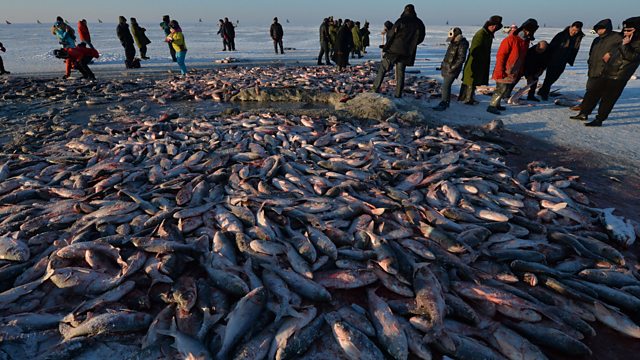Global fish catches under-reported
Global fish catches; Killer whale extinction threat in Europe; New bird species in India; Beards are healthy; A new planet; Flower in space; Space farming.
Estimates of global fish catches over the past sixty years have been vastly underestimated, according to a new study in the journal Nature Communications. In certain cases it was found that previous estimates may have been over 50% too low. Scientists at the University of British Columbia, along with many collaborators across the world, found this out by using an approach called βcatch reconstructionβ where they use local knowledge to fill in missing gaps in global data sets. Professor Daniel Pauly, one of the lead authors of the paper, talks to Jack Stewart about the findings and the reliability of the available data.
Killer whale extinction threat in Europe
The first ever analysis of the impact of organochloride pollutants on Europeans top marine predators has revealed that some species have dangerously high levels of pollutants in their blubber. The research, published in the journal Scientific Reports, shows that banned chemicals β called PCBβs β have stayed in the marine environment, making their way up the food chain, accumulating in top predators like killer whales and bottlenose dolphins. The levels found in the blubber of some of these animals is at dangerously high levels and appears to be impacting breeding and the health of newborn calves. Dr. Paul Jepson, from ZSL, is one of the authors of the study.
New bird species in India
Scientists have described a new species of bird in northern India and China, called the Himalayan forest thrush. During fieldwork in the mountains, researchers noticed that thrushes in the forests sang much more musically than those on the rocky peaks.
They then discovered physical and genetic differences as well, and have now declared the known "plain-backed thrush" to be two distinct species. The mountain-dwelling variety has been re-christened the "alpine thrush".
Beards are healthy
A study, published in the Journal of Hospital Infection, shows that clean shaven hospital staff, swabbed to find out what bacteria were growing on their skin, were more likely to carry drug resistant bacteria on their faces than their bearded colleagues.
A new planet?
American astronomers say they may have found a ninth planet in our Solar System orbiting far beyond Pluto. The team, from the California Institute of Technology (Caltech), has no direct observations to confirm its presence but hope that scientists will use Earth based telescopes to look for this possible new solar system member.
Flower in space
A flower has bloomed for the first time on the International Space Station
Space farming
Scientists at the University of Arizona are trying to mimic conditions in Space and grow fruit and vegetables.
(Photo: Chinese Mongolian ethnic group catching fish using a centuries old technique of placing a net under ice Β© MARK RALSTON/AFP/Getty Images)
Presenter: Jack Stewart
Producer: Ania Lichtarowicz
Last on
More episodes
Previous
Broadcasts
- Thu 21 Jan 2016 20:32GMTΒιΆΉΤΌΕΔ World Service Europe and the Middle East, Online, UK DAB/Freeview & Americas and the Caribbean only
- Thu 21 Jan 2016 21:32GMTΒιΆΉΤΌΕΔ World Service South Asia, West and Central Africa, East Asia & Australasia only
- Fri 22 Jan 2016 02:32GMTΒιΆΉΤΌΕΔ World Service Americas and the Caribbean
- Fri 22 Jan 2016 03:32GMTΒιΆΉΤΌΕΔ World Service Online, East Asia, Europe and the Middle East & UK DAB/Freeview only
- Fri 22 Jan 2016 04:32GMTΒιΆΉΤΌΕΔ World Service South Asia
- Fri 22 Jan 2016 05:32GMTΒιΆΉΤΌΕΔ World Service Australasia
- Fri 22 Jan 2016 07:32GMTΒιΆΉΤΌΕΔ World Service East and Southern Africa & Europe and the Middle East only
- Fri 22 Jan 2016 13:32GMTΒιΆΉΤΌΕΔ World Service Online & UK DAB/Freeview only
- Fri 22 Jan 2016 14:32GMTΒιΆΉΤΌΕΔ World Service East and Southern Africa, Europe and the Middle East, East Asia, South Asia & West and Central Africa only
Podcast
-
![]()
Science In Action
The ΒιΆΉΤΌΕΔ brings you all the week's science news.


